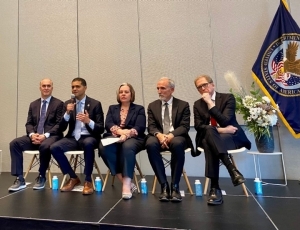por
John R. Fischer, Senior Reporter | July 17, 2023

Stanford Medicine and VA Palo Alto are building an NCI-designated cancer care and research center. (Photo courtesy of Stanford Medicine/Mark Conley)
To accommodate the expansion of patients eligible for cancer treatment under the PACT Act, Stanford Medicine and the U.S. Department of Veterans Affairs Palo Alto Health Care System are building a National Cancer Institute-designated joint cancer care and research center on the VA Palo Alto campus.
President Joe Biden signed the
Sergeant First Class Heath Robinson Honoring our Promise to Address Comprehensive Toxics (PACT) Act into law in August 2022 for expanding and improving healthcare access for veterans exposed to toxic substances, such as from burn pits, during military service.
The legislation specifically targets veterans of the Vietnam, Gulf, and post-9/11 wars, and extends care for over 20 conditions presumably caused by toxic exposures, including brain, pancreatic, and kidney cancers; glioblastomas; melanomas; and any types of gastrointestinal, lymphoma, head and neck, reproductive, and respiratory cancers.
In a statement, Dr. Shereef Elnahal, VHA undersecretary for health, says this may be “the largest expansion of veteran’s benefits in history.”
Stanford and VA Palo Alto Health Care signed a memorandum of understanding on June 30, and expect the center to primarily accommodate the growing number of eligible veterans in the Bay Area. Construction, timing, cost, and staffing are still being discussed, but here are three things that are known about the center:
- May expand specific cancer programs by integrating clinical trials into care.
- Improves health equity by increasing clinical trials in underserved communities, as well as research into persistent health disparities that adversely affect cancer outcomes.
- Supports Biden’s Cancer Moonshot Initiative, which aims to cut deaths from cancer in half over the next 25 years; and supporting its objectives for prevention, earlier diagnosis, better treatments, and decreasing healthcare inequities.
Both organizations hope to have the center operational within five years.
Stanford Medicine did not respond to HCB News in time for publication.
